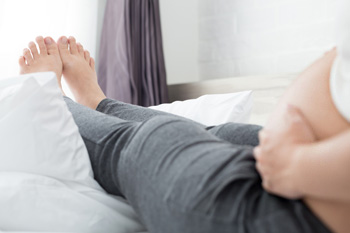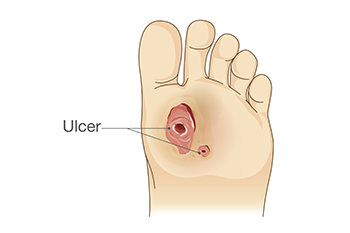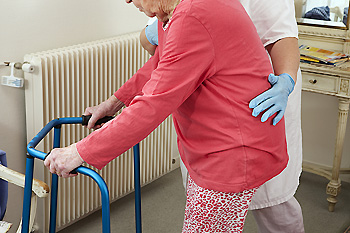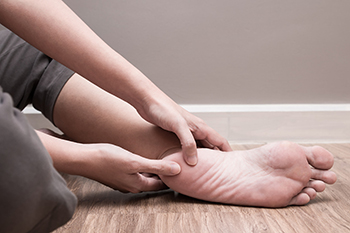Items filtered by date: April 2023
Athlete's Foot and Pregnancy

When a woman becomes pregnant, it can be especially important for them to maintain proper foot health. One condition that might occur during a woman’s pregnancy is known as athlete's foot. This particular condition of the foot may develop when a woman becomes pregnant because the pregnancy can often make a woman sweat profusely, causing the feet to become moist and susceptible to fungal infections. If you are a pregnant woman with athlete’s foot, your medical professional might advise you against using certain over-the-counter antifungal medications incompatible with pregnancies. If you are demonstrating any of the signs of athlete's foot, such as itching, redness, or flaking, then it is highly suggested that you contact a podiatrist today for immediate attention.
Pregnant women with swollen feet can be treated with a variety of different methods that are readily available. For more information about other cures for swollen feet during pregnancy, consult with Donald Manger, DPM from Associated Podiatric Physicians, PA. Our doctor will attend to all of your foot and ankle needs.
What Foot Problems Can Arise During Pregnancy?
One problem that can occur is overpronation, which occurs when the arch of the foot flattens and tends to roll inward. This can cause pain and discomfort in your heels while you’re walking or even just standing up, trying to support your baby.
Another problem is edema, or swelling in the extremities. This often affects the feet during pregnancy but tends to occur in the later stages.
How Can I Keep My Feet Healthy During Pregnancy?
- Wearing orthotics can provide extra support for the feet and help distribute weight evenly
- Minimize the amount of time spent walking barefoot
- Wear shoes with good arch support
- Wear shoes that allow for good circulation to the feet
- Elevate feet if you experience swelling
- Massage your feet
- Get regular, light exercise, such as walking, to promote blood circulation to the feet
If you have any questions please feel free to contact our office located in Hamilton Township, NJ . We offer the newest diagnostic and treatment technologies for all your foot and ankle needs.
Causes and Risks of Diabetic Foot Ulcers

Diabetics are often at risk of other conditions that negatively affect their feet. These include peripheral neuropathy, which renders the feet numb, and peripheral artery disease, which slows the healing process. Both are the result of maintaining high blood sugar levels. Any sore or bruise on the feet that are not tended to immediately can easily become ulcerous. Termed foot ulcers, these open sores or wounds are usually found on the sole of the foot or the bottom of the big toe. Unless the diabetic’s feet are checked daily for such injuries, they can easily go undetected. An open foot ulcer increases the chance of developing an infection, which in turn can involve deeper layers of the skin, muscles, tendons, bones, and joints. In the most severe cases, surgery is required and loss of a limb is a possibility. If you are at risk of developing diabetic foot ulcers, it is suggested that you make an appointment with a podiatrist who is trained to deal with diabetes-related problems.
Diabetic foot care is important in preventing foot ailments such as ulcers. If you are suffering from diabetes or have any other concerns about your feet, contact Donald Manger, DPM from Associated Podiatric Physicians, PA. Our doctor can provide the care you need to keep you pain-free and on your feet.
Diabetic Foot Care
Diabetes affects millions of people every year. The condition can damage blood vessels in many parts of the body, especially the feet. Because of this, taking care of your feet is essential if you have diabetes, and having a podiatrist help monitor your foot health is highly recommended.
The Importance of Caring for Your Feet
- Routinely inspect your feet for bruises or sores.
- Wear socks that fit your feet comfortably.
- Wear comfortable shoes that provide adequate support.
Patients with diabetes should have their doctor monitor their blood levels, as blood sugar levels play such a huge role in diabetic care. Monitoring these levels on a regular basis is highly advised.
It is always best to inform your healthcare professional of any concerns you may have regarding your feet, especially for diabetic patients. Early treatment and routine foot examinations are keys to maintaining proper health, especially because severe complications can arise if proper treatment is not applied.
If you have any questions please feel free to contact our office located in Hamilton Township, NJ . We offer the newest diagnostic and treatment technologies for all your foot and ankle needs.
Wounds That Don't Heal Need to Be Checked
Preventing Falls in the Living Room

It can be exceedingly important for senior citizens to protect the health of their feet by guarding against a detrimental fall. Suffering a fall can exacerbate existing foot problems and lead to the development of new foot conditions. Many seniors might experience a fall in the living room. A senior may help prevent falls in the living room by arranging their furniture so there are clear walking paths to navigate. This can reduce the risk of falling. Additionally, it might be helpful for a senior citizen to minimize clutter by removing furniture or decorative items that are no longer being used. For example, removing non-useful furniture or loose rugs can help clear up the living room space. If you are a senior citizen or are caring for one, it is highly suggested that you contact a podiatrist today to schedule an appointment.
Preventing falls among the elderly is very important. If you are older and have fallen or fear that you are prone to falling, consult with Donald Manger, DPM from Associated Podiatric Physicians, PA. Our doctor will assess your condition and provide you with quality advice and care.
Every 11 seconds, an elderly American is being treated in an emergency room for a fall related injury. Falls are the leading cause of head and hip injuries for those 65 and older. Due to decreases in strength, balance, senses, and lack of awareness, elderly persons are very susceptible to falling. Thankfully, there are a number of things older persons can do to prevent falls.
How to Prevent Falls
Some effective methods that older persons can do to prevent falls include:
- Enrolling in strength and balance exercise program to increase balance and strength
- Periodically having your sight and hearing checked
- Discuss any medications you have with a doctor to see if it increases the risk of falling
- Clearing the house of falling hazards and installing devices like grab bars and railings
- Utilizing a walker or cane
- Wearing shoes that provide good support and cushioning
- Talking to family members about falling and increasing awareness
Falling can be a traumatic and embarrassing experience for elderly persons; this can make them less willing to leave the house, and less willing to talk to someone about their fears of falling. Doing such things, however, will increase the likelihood of tripping or losing one’s balance. Knowing the causes of falling and how to prevent them is the best way to mitigate the risk of serious injury.
If you have any questions, please feel free to contact our office located in Hamilton Township, NJ . We offer the newest diagnostic and treatment technologies for all your foot care needs.
Symptoms of Sever’s Disease

Heel pain in children and young teenagers may indicate that the foot condition Sever’s disease has developed. Sever's disease is a heel bone disorder that can occur due to a growth spurt that affects the heel plate. When this happens, the Achilles tendon pulls on the heel, causing it to become inflamed and swollen. It generally occurs in children who participate in sports activities that involve running and jumping. A common symptom is severe heel pain, which may lead the child to limp or walk on tiptoes. Additionally, the calf muscles can tighten, and there may be a loss of range of motion in the ankle. Successful treatment often begins with stopping the activity that caused Sever's disease, and frequently elevating the affected foot may help to reduce the swelling. If your child is active and has heel pain, it is suggested that you schedule an appointment with a podiatrist who can diagnose and treat Sever’s disease.
Sever's disease often occurs in children and teens. If your child is experiencing foot or ankle pain, see Donald Manger, DPM from Associated Podiatric Physicians, PA. Our doctor can treat your child’s foot and ankle needs.
Sever’s Disease
Sever’s disease is also known as calcaneal apophysitis, which is a medical condition that causes heel pain I none or both feet. The disease is known to affect children between the ages of 8 and 14.
Sever’s disease occurs when part of the child’s heel known as the growth plate (calcaneal epiphysis) is attached to the Achilles tendon. This area can suffer injury when the muscles and tendons of the growing foot do not keep pace with bone growth. Therefore, the constant pain which one experiences at the back of the heel will make the child unable to put any weight on the heel. The child is then forced to walk on their toes.
Symptoms
Acute pain – Pain associated with Sever’s disease is usually felt in the heel when the child engages in physical activity such as walking, jumping and or running.
Highly active – Children who are very active are among the most susceptible in experiencing Sever’s disease, because of the stress and tension placed on their feet.
If you have any questions, please feel free to contact our office located in Hamilton Township, NJ . We offer the newest diagnostic and treatment technologies for all your foot and ankle injuries.

